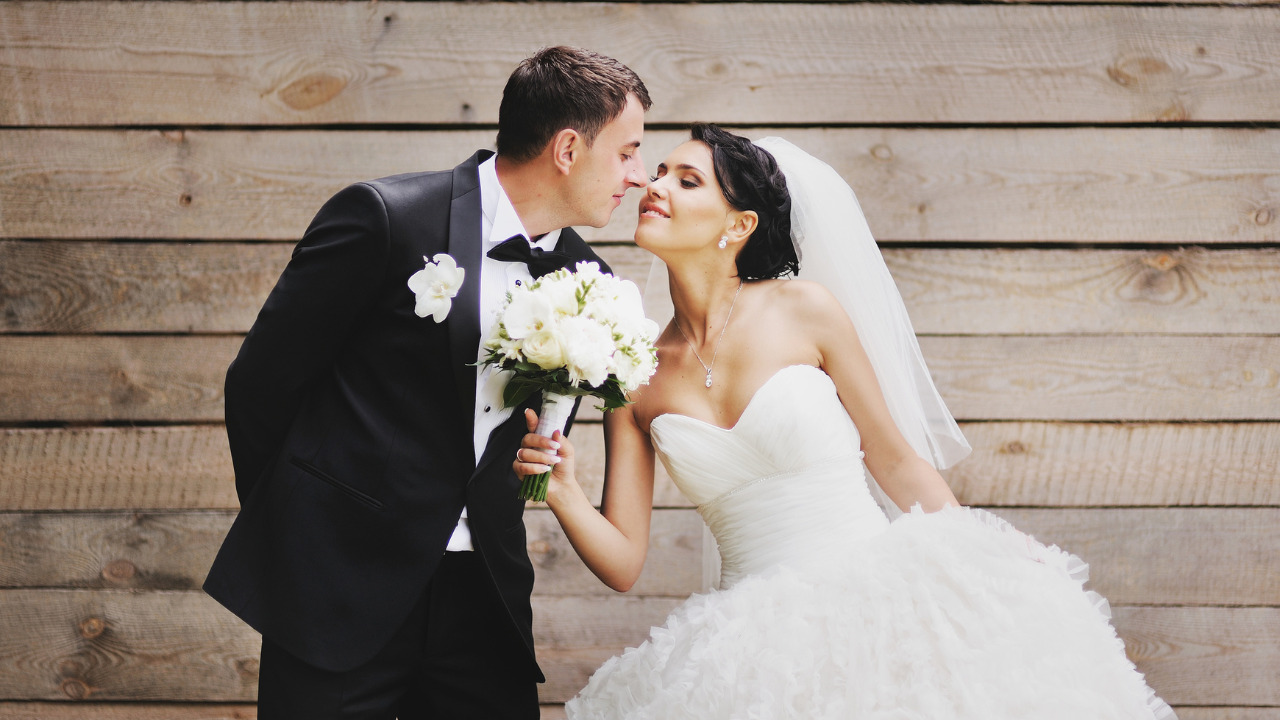Planning your destination wedding from the mainland isn’t as difficult as you might think. Often it’s as easy as making a few calls and sending a few emails. Many resorts now include the services of an experienced and knowledgeable wedding coordinator, and there are many more available for hire throughout the islands. If you want to go at it alone without the help of a coordinator, be prepared for extensive research, preliminary trips (hey, there are worse things!), and perhaps some timing snafus.
Q. How do we know which area to choose?
A. There are many ways to choose the ideal destination for your wedding, whether you’re looking for someplace close and cheap, a lush terrain, lots of activities, or do-not-disturb seclusion. For a full breakdown of each area’s unique charm, click here . But to get you started, here’s a breakdown of five particularly wedding-worthy Caribbean islands.
If you’re looking for luxury resorts alive with local flavor on white sand beaches, check out Aruba.
- Location: Just off the coast of Venezuela, Aruba is the smallest of the Dutch territories (a little larger than Washington DC).
- Climate: The island is renowned for its pleasant, tropical climate — temperatures hover around 80 degrees F year-round thanks to trade winds from the Atlantic Ocean. One great advantage: Aruba lies below the hurricane belt, so no need to plan around hurricane season.
- Where to Stay: Aruba is full of luxury resorts situated near its pastel-colored capital, Oranjestad. One way to save: Try to secure a package deal if staying at one of these resorts since accommodations in Aruba can be pricey.
- Things to Do: Endless stretches of white sand beaches allow for plenty of lounging in the sun and tons of windsurfing, diving and snorkeling. Venture into the island’s less-developed interior for hiking and horseback riding.
- Culture: Influences here are a mix of Dutch, Portuguese, Spanish, French and native Indian influences. You’ll hear Dutch, English, Spanish and Papiamiento, spoken. The most popular music styles are calypso, soca, merengue and a local blend called socarengue.
If a secluded island rich in untouched natural beauty is what you’re after, try the Turks & Caicos Islands.
- Location: The Turks and Caicos Islands are a collection of 40 islands (eight of which are inhabited) southeast of the Bahamas. These islands are not as developed as many in the Caribbean, so there is less commercialization and a beautiful, intimate setting is readily available.
- Climate: The islands are relatively sunny and dry. Things heat up from August to November — the average daily high temperature peaking at a scorching 100 degrees F — but temperatures from December to July are much milder.
- Where to Stay: Though many of the islands remain rural and undeveloped, the island of Providenciales (also called Provo) houses a slew of gorgeous resort hotels.
- Things to Do: Grand Turk island has beautiful beaches in and around the capital city, Cockburn Town; South Caicos offers some of the world’s best scuba diving; West Caicos has great reefs for diving; North, Middle & East Caicos have lush, creek-watered landscapes as well as lagoons and marshy wetlands; whale and bird watching are also available on many of the islands
- Culture: Indigenous culture similar to that of the Bahamas. There is also a strong Bermudan, Haitian and Dominican presence on the islands.
If you’re thinking, good mix of beautiful beaches and amazing urban sights (for less than you’ll pay elsewhere in the Caribbean), the Dominican Republic is the place for you.
- Location: Occupies the eastern side of the island, Hispaniola, northwest of Puerto Rico. The country is about two times the size of New Hampshire.
- Climate: August is hot and muggy, while January is somewhat milder. October to May marks the rainy season for the north, while showers fall on the south during May to October. Don’t take the weather lightly — Dominican rain is serious — it pours steadily and could last half a day. The Dominican Republic is also situated in the middle of the hurricane belt and is susceptible to severe storms from June to October.
- Where to Stay: Where you choose to stay depends on what you’re looking for. For luxury resorts on the beach, stay in the north in cities like Puerto Plata, Punta Cana and Cabarete. For historic sites and colonial architecture, try Santo Domingo or Santiago.
- Things to Do: Sightsee in Santo Domingo and Santiago; windsurf and party in Cabarete; dive and surf in Sosua; lounge on the beaches of Puerto Plata and Punta Cana; hike in the central highlands; whale-watch in Samana.
- Culture: Taino Indians, Spaniards and Africans have all left their mark on the Dominican Republic. Music and dance lie at the heart of Dominican culture — merengue is the most popular on the island.
If beautiful beaches and a virtually crime-free environment are what you’re after, consider Anguilla.
- Location: Situated just south of St. Maarten an St. Martin, Anguilla is roughly half the size of Washington DC.
- Climate: Tropical climate moderated by northeast trade winds but subject to frequent hurricanes and other tropical storms from July to October. Rainy season lasts from August through November.
- Where to Stay: Anguilla is one of the more upscale destinations in the Caribbean. You’ll have no problem finding luxury on this island — for a price. Stay on Meads Bay where some of the island’s most stylish hotels are located. Hotels here are a good distance away from one another, so you won’t have to worry about privacy.
- Things to Do: Swimming, snorkeling, and beaching, of course. Visit some of the island’s archaeological and historic sites in Shoal Bay East and The Valley. Watch the boat races — they’re intense.
- Culture: West Indian culture, a blend of British and African influences, with a heavy dependence on the sea. If you want sheer magnificence both on land and in the water, opt for Tortola.
- Location: The heart of the British Virgin Islands, Tortola is just northeast of the US Virgin Islands.
- Climate: Tortola is almost always balmy and humid, so it’s best to visit outside of the hurricane season, July to October.
- Where to Stay: The island has range of hotels, all with access to phenomenal beaches, so the choice is yours.
- Things to Do: Anything in the water or on the beach — there is also a good variety of restaurants and nightclubs in Tortola for when the sun goes down. The museum and botanic gardens are also worth seeing.
- Culture: Mix of British and West Indian influences and people like to party, especially to Calypso tunes.
Photo: Spencer Gordon Photography
Q. Are we responsible for our guests’ expenses?
A. Most couples that go the destination-wedding route do not have the means to pay all of their guests’ ways, but if you do, it’s a wonderful gesture and of course they will appreciate it. Airfare to the Caribbean can be expensive, but food and lodging often offer great bargains. That said, guests are committing themselves more financially and time-wise than they would for a wedding closer to home — they’re probably treating this as a vacation. This is one type of wedding you will need to plan further in advance if you’re inviting lots of guests, save-the-date cards are crucial. Whatever you do, make sure that you provide lots of economical options for your guests.
Q. We want to incorporate a little Caribbean culture without having a theme wedding. Any ideas?
A. Be creative by adding accents local to that particular region — anything from a native flower to regional drink. Here are a few ideas.
If you’re marrying in…
- Dominican Republic: learn merengue, the most popular form of dance and music on the island, to wow your guests (and locals) with your first dance.
- Anguilla, carry a bouquet of Oleander, Cedar, and Hibiscus — all flowers native to the island.
- Jamaica: give your guests a taste of the island, literally — serve local favorites like cassava bread, curry shrimp, jerk chicken and rum cake at your reception.
- Grenada, send your guests off with individually packaged bottles of nutmeg, cinnamon or ginger — all produced on the island.
- Bahamas: jam with a local steel drum band in true Bahamian style.
- Puerto Rico: learn a few Spanish phrases to recite to your sweetie at the ceremony and/or reception.
- Bermuda: walk under a moon gate after your ceremony — it’s a local tradition for good luck. Top the groom’s cake with a gold leaf for prosperity and the bride’s cake with a silver leaf and a small cedar sapling (which is later replanted) for the growth of the newlywed’s love.
- Turks & Caicos Islands: incorporate native customs like basket weaving.
Q. If we want a more classic, modern style rather than a tropical theme wedding, are there other option for us?
A. Choose one of the British (or ex-British) territories like Anguilla, Antigua or the Bahamas. The mood tends to be more formal and you’re just as likely to watch a game of cricket as you are to sunbathe on the beach. Also, look for resorts that are more contemporary in nature — a clean, white building with a modern style ballroom.
Q. Are there any must-dos that we should advise our guests of?
A. Since the Caribbean offers so many choices of activities – snorkeling, horseback riding, hiking and beaching — it’s probably a good idea to provide each guest with an up-to-date travel guide for the area. Act as their hosts and see that they are kept entertained, which shouldn’t be too difficult. Hotel concierges are great resources for itinerary ideas. Encourage your guests to participate, but don’t be demanding. Realize that they’ll probably want to spend at least some time just hanging out in their air-conditioned rooms.
Q. Are there any local drinks or culinary specialties that we should know about and incorporate?
A. Concierges and travel books are a great resource for these types of things. Check the Internet for a web site for your specific town or area — they’ll often clue you in to local specialties you won’t want to miss. Consider serving Pina Coladas at your Puerto Rican fiesta, Goombay Smash at you Bahamian bash, or Rum Punch at your Jamaican soiree.
Photo: Spencer Gordon Photography



